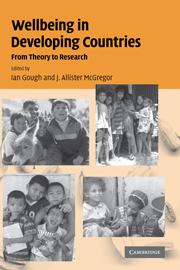Book contents
- Frontmatter
- Contents
- Figures
- Tables
- Notes on contributors
- Acronyms
- Preface
- Introduction
- 1 Theorising wellbeing in international development
- Part I Human needs and human wellbeing
- Part II Resources, agency and meaning
- Part III Quality of life and subjective wellbeing
- 10 Cross-cultural quality of life assessment approaches and experiences from the health care field
- 11 Researching quality of life in a developing country: lessons from the South African case
- 12 The complexity of wellbeing: a life-satisfaction conception and a domains-of-life approach
- Conclusion: researching wellbeing
- References
- Index
12 - The complexity of wellbeing: a life-satisfaction conception and a domains-of-life approach
Published online by Cambridge University Press: 22 September 2009
- Frontmatter
- Contents
- Figures
- Tables
- Notes on contributors
- Acronyms
- Preface
- Introduction
- 1 Theorising wellbeing in international development
- Part I Human needs and human wellbeing
- Part II Resources, agency and meaning
- Part III Quality of life and subjective wellbeing
- 10 Cross-cultural quality of life assessment approaches and experiences from the health care field
- 11 Researching quality of life in a developing country: lessons from the South African case
- 12 The complexity of wellbeing: a life-satisfaction conception and a domains-of-life approach
- Conclusion: researching wellbeing
- References
- Index
Summary
An economist who is nothing but an economist is a danger to his neighbours. Economics is not a thing in itself; it is a study of one aspect of the life of man in society.
John R. Hicks 1941: 6–7, cited by Meier 1991: 352Introduction
John Hicks's statement is important in many ways. First, it states that there are many aspects or domains in a person's life; thus, a person's wellbeing is expected to be related to her situation in all these aspects of life. Second, it recognises that economists usually deal with just one aspect of a person's life; hence, it is impossible to understand a person's wellbeing from an economic perspective alone. Third, it also recognises that economics, as a discipline, is an academic construct that studies only one aspect of a person's life. Hicks's comment refers to economics but it could also apply to any other of the social sciences. Fourth, it recognises that every person is in a society; hence, her wellbeing should be understood within her particular context and culture and in her relation to other persons. Consequently, a person is defined as such within her specific context, and there is no room for an out-of-any-context individual. Finally, it calls for an interdisciplinary study of human beings.
This investigation uses a life-satisfaction conception to study wellbeing. The investigation directly asks persons about their satisfaction with their lives, and this information is used as a proxy for a person's wellbeing.
- Type
- Chapter
- Information
- Wellbeing in Developing CountriesFrom Theory to Research, pp. 259 - 280Publisher: Cambridge University PressPrint publication year: 2007
- 42
- Cited by



